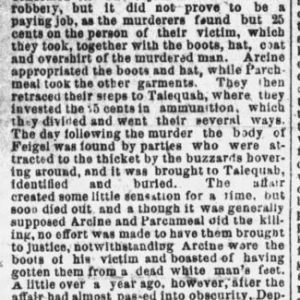calsfoundation@cals.org
William Parchmeal (Execution of)
On June 26, 1885, a Cherokee man named William Parchmeal was hanged at Fort Smith (Sebastian County) for the murder of a man named Henry Fiegel (also reported as Feigel, Figel, and Figet). The case has received a lot of mention over the years because Parchmeal’s co-defendant, James Arcene, was reportedly only around ten years old when the crime was committed, making him the youngest juvenile offender in the federal court system to receive the death sentence. Little is known about any of the people named above. Civil War records, however, do list a William Parchmeal who enlisted as a private in Company C of the Second Indian Home Guards, Kansas Infantry (Union). The records provide no additional information about him.
The crime for which Arcene and Parchmeal were executed was committed near Tahlequah, the capital of the Cherokee Nation, in November 1872. The Arkansas Gazette provided details of the crime on June 27, 1885, the day after the execution. According to reports, a Swede (sometimes described as a Dutchman or a German) named Henry Fiegel (here called Feigel) stopped in Tahlequah to have his shoes resoled, after which he set off for Fort Gibson. Planning to rob him, Arcene (here called Arcine) and Parchmeal followed behind, and at a secluded spot they shot him four times and then bludgeoned him over the head. They robbed him of his clothing but found only twenty-five cents on his person. They then dragged his body into a thicket and concealed it. Returning to Tahlequah, they spent their small takings on ammunition. Circling vultures led to the discovery of the body the next day; it was then identified and buried. Arcene and Parchmeal were suspected of the crime, but no action was taken.
According to the Gazette, a deputy marshal named Andrews began to investigate the crime early in 1884. He assembled some evidence, which led to the arrest of Arcene on March 30 and Parchmeal on August 1. Parchmeal claimed to know about the murder, even taking Andrews to the scene, but claimed that Arcene was responsible.
The two were first tried in the November 1884 term of the court. According to a January 10, 1885, article in the Gazette, the trial commenced on Christmas Eve and lasted for two weeks. It went to the jury on January 5, 1885, but the jurors eventually deadlocked, with ten jurors for conviction and two for acquittal. According to the article, it was “one of the most complicated and expensive cases ever before the court,” having cost the government $2,000 at that point. Each defendant blamed it on the other, and the remaining evidence was all circumstantial. According to the June article in the Gazette, a second trial was held during the February term, and Parchmeal and Arcene were found guilty on March 28. The Fort Worth Daily Gazette reported that, on May 6, the circuit court delivered a sentence of death by hanging, to take place on June 27. Several other newspapers also gave this date, although the execution itself took place on June 26. According to the Arkansas Gazette, “After receiving sentence both men began paying particular attention to religious matters, appearing to have made earnest efforts for the salvation of their souls, praying and singing every day, mostly in their own language.” At the same time, their attorneys were pursuing appeals, although the president ultimately refused to interfere.
Parchmeal and Arcene were executed on the afternoon of June 26, 1885. According to the Arkansas Democrat, the hanging was a relatively private one, with only reporters, doctors, and a few others admitted. According to the Arkansas Gazette, the accused “took the matter with that stoicism peculiar to the Indian race, walking to the gallows firmly.” (This reference to the stoic Native American is a common trope in newspapers of the time.)
Although they had each consistently declared their innocence, they confessed while standing on the trap. Parchmeal reportedly said “that it was his fault, as he had concocted the murder himself.” The New York Times and several other papers reported on Arcene’s confession. He said that as a boy, he was playing cards at a house outside Tahlequah. Parchmeal came in and asked him to come with him; after crossing the prairie, they got on to the Fort Gibson road. They saw a man coming, and Parchmeal gave Arcene a pistol and told him to shoot him. Arcene did so and then crushed his head and helped to drag him off the road. According to Arcene, “He did not know why Parchmeal wanted Fiegel killed, and being only a boy at the time, did not know it was wrong.” The Times indicated that both men “died without a struggle, and swelled the number who have been executed here during the last 11 years for crimes committed in Indian Territory to 66.”
For additional information:
“1885: James Arcene, the Youngest Juvenile Offender Hanged in the US?” ExecutedToday.com, June 26, 2010. http://www.executedtoday.com/2010/06/26/1885-james-arcene-william-parchmeal-fort-smith/ (accessed April 16, 2024).
“Border City Gossip.” Arkansas Gazette, January 10, 1885, p. 4.
“Hanged on the Gallows.” New York Times, June 27, 1885, p. 2.
“Indians Sentenced to Be Hanged.” Fort Worth Daily Gazette, May 7, 1885, p. 3
“Murder for Money.” Arkansas Gazette, June 27, 1885, p. 3.
“Through the Trap.” Arkansas Democrat, June 26, 1885, p. 3.
Nancy Snell Griffith
Davidson, North Carolina
 Law
Law Post-Reconstruction through the Gilded Age, 1875 through 1900
Post-Reconstruction through the Gilded Age, 1875 through 1900 William Parchmeal Execution Article
William Parchmeal Execution Article 



Comments
No comments on this entry yet.